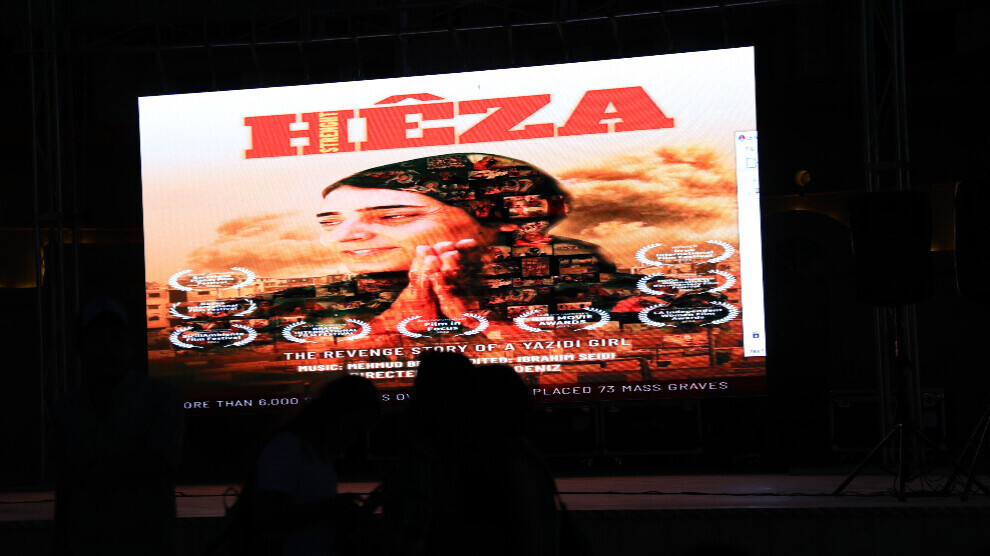Nûjiyan Women’s Film Festival brings women together
The Nûjiyan Women’s Film Festival held in Qamishlo from May 25 to May 31, 2025 brought dozens of women from many countries together.

BÊRÎVAN ÎNATÇÎ
Qamishlo (Qamishli)- Nûjiyan Women’s Film Festival was held in the city of Qamishlo from May 25 to May 31, 2025. 40 films by women filmmakers from four parts of Kurdistan, Iran, Afghanistan, European countries, Portugal, Armenia, South America and Arab countries were screened at the festival.
During the festival, panels, a handicraft exhibition and a photo exhibition of journalists Cihan Bilgin and Nazım Daştan, who were killed in a Turkish drone strike, were organized.
Women filmmakers from Rojhilat (Eastern) and Bashur (Southern) Kurdistan were also expected to participate in the festival; however, the forces of the Kurdistan Democratic Party (KDP) did not allow them to cross the Semalka border crossing although they had a permission. Despite all the obstacles, many women came to North and East Syria to take part in the festival.
The festival was held at the Mihemed Şêxo Culture and Art Centre in the afternoons and at the Azadî Park in the evenings.
Some of the films screened at the festival are: “Aurora’s Sunrise”, a film telling the Armenian Genocide; “Hêza”, a documentary film telling the story of a Yazidi woman (Hêza) who had been enslaved during the attacks of ISIS on Shengal. Hêza joined the YJŞ and became a commander after returning to Shengal; “Anqa”, a documentary film telling the story of three women living in Jordan; “Sima’s Song”, a film telling the stories of Afghan women.
Silvia Di Marco, Co-director of the Olhares do Mediterrâneo/ Women’s Film Festival in Portugal, and Isabella Balena, an independent photojournalist from Italy, attended the Nûjiyan Women’s Film Festival.
‘I want to know more about this place’
“I am co-director of the Olhares do Mediterrâneo. It is the oldest festival of women filmmakers in Portugal,” Silvia Di Marco told NuJINHA. “We started in 2014 and this year, we have our 12th edition. I'm co-director and one of the programmers of the festival.”
Silvia Di Marco attended the Nûjiyan Women’s Film Festival to “know the struggle and the history” of Rojava. “Because I know it's a long history back. I want to learn more. I am very happy that I will stay here one more week after the festival. I want to talk with the people and understand more about the place.”
She also commented on the atmosphere of the festival. “I am here with you at the festival. I see a lot of energy, a lot of women doing amazing things so it's a very strong feeling and I see that there are people doing something very important and something that is changing the world. But then, I just see a normal city on the streets. It is a very important festival and holding a women's film festival in Rojava is a very important step. I think that the selection of films is very interesting. Some films are very very strong. We also show these films at our festival because we know that it is important to show them.”
Silvia Di Marco pointed to the young women’s participation in the festival and said, “I see so many young women collaborating here. They are filming, taking photographs. We are having some workshops with them and this makes me think that things are accelerating and going still better for the future. I think that cinema is super important as an instrument of communication and as an instrument of transformation because the stories we tell and the way we tell these stories are super important to transform society.”
She expressed her pride in collaborating with the festival held in Qamishlo. “It is time for the people who never have a voice to have their voice. Cinema is a very accessible way of communicating and so it is very very important and can be very powerful because it touches on the emotions of people and conveys knowledge at the same time. Every film has a story.I just want to thank the Nûjiyan Women’s Film Festival for inviting me and my friend Sarah to come here. It is an incredible honor and it is an incredible experience to be here. We are meeting incredible people, so friendly, so open to us and yes I think that when I go back my heart will stay here.”
“I came here to participate in the festival in order to know this place and what the women here are doing,” Isabella Balena told us. “Because we know the women’s revolution of Rojava in Italy. So I'd like to see this place and to see what the women are doing here. I came here to make a reportage (interview) about you. I do not have a lot of opportunities to see your organizations now because the festival is busy.”
Isabella Balena thinks that the Nûjiyan Women’s Film Festival was very interesting. “It is very interesting for us, for Western countries. This is a really good experience for us to see what's happening here. This is the first edition of the festival but I think it is very important because we can see what the strong women of Rojava are doing. The festival is a very good opportunity for the Western countries and the world to know what is happening here.”
